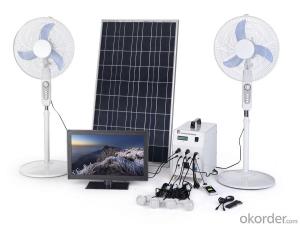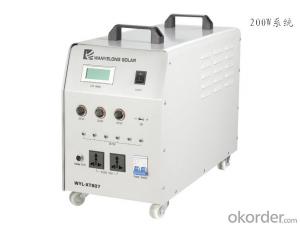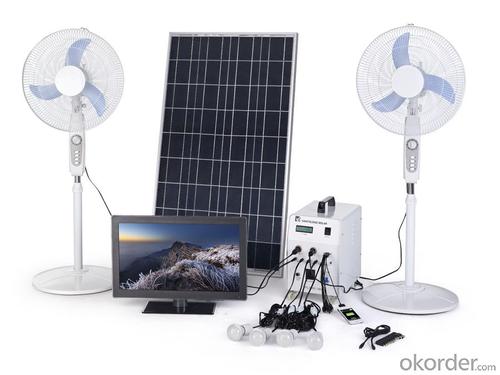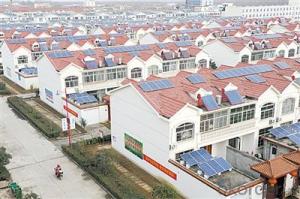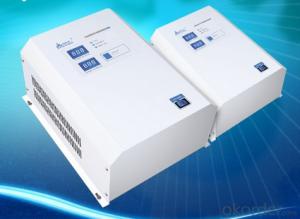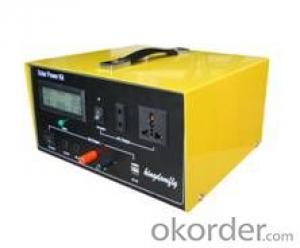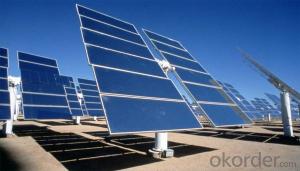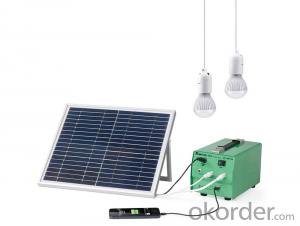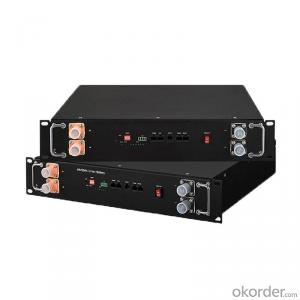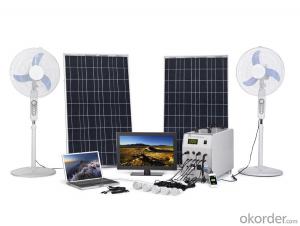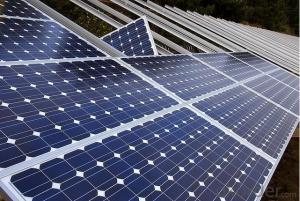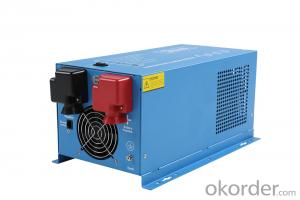200W Solar Power System Integrated Power Supply Box
- Loading Port:
- Guangzhou
- Payment Terms:
- TT OR LC
- Min Order Qty:
- 20 set
- Supply Capability:
- 10000 set/month
OKorder Service Pledge
OKorder Financial Service
You Might Also Like
Specification
1. Solar panel : crystalline silicon 100W18V, efficiency>=16%;
2. Integrated power supply box : Built-in maintenance-free lead-acid battery: 55AH12V, PWM controller: 25A12V; Pure sine wave inverter: 300W12V; 1*USB output for charging cell phone. 2*cigarette lighter output for charging DC12V fan. 4*2.5W12V output for LED lamp;
3. LED lamp : 3W12V with 5m wires and switches, 4 set;
4. Charging and using time: battery full charged time 6hours. 2 fans and 4 LED lamps totally using time 10hours;
5. Warranty: Panel 10 years; Battery 1 year; others 2 year.
Solar panel | Poly crystalline 100W 18V | |
Battery | 55AH12V lead-acid battery | |
LED lamp | 3watt, >50000 hours | |
cable of led lamp | 5m | |
Weight | 40 kg/set | |
Output | DC 12V and DC 5V,AC 110V~240V | |
Working Time | 2 fans and 4 LED lamps totally | |
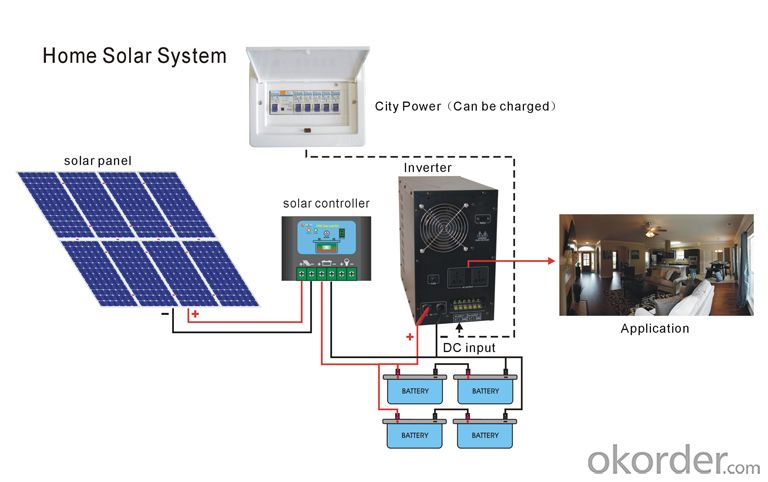
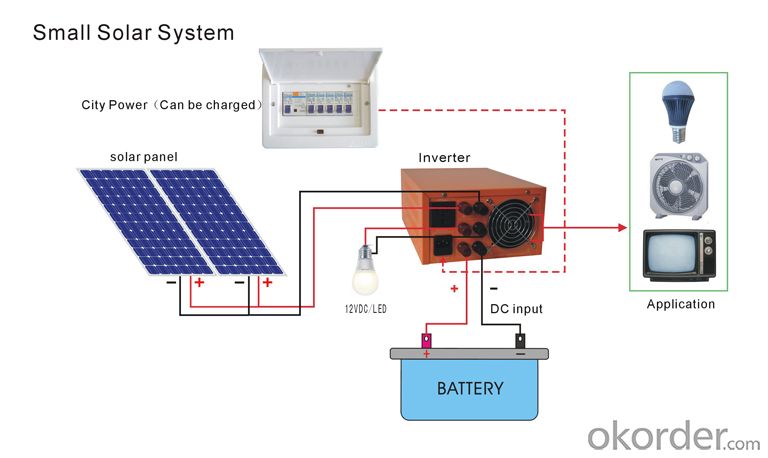
Quantuty
Quality goal:Constant innovation to meet the request of the customers. Protect the environment, provide environmental products to customer.
Quality strategy:
Quality: established high efficiency quality manager system in line with ISO9001 and ISO/TS16949.
Improvement: keeping improvement & quality guarantee.
Efficiency: delivery on time, complete the agreed events with the customers on time.
Service: focus on customers, provide the service and technology support on time.
FAQ
1. How long will my inquiry get response?
Your inquiry related to our products or prices will be replied within 24 hours.
2. Can I get professional service and suggestion?
Well-trained and experienced staffs to answer all your questions in fluent English.
3. Do you accept OEM or customized design?
OEM & ODM, any your customized lightings we can help you to design and put into product.
4. What if I need specific design?
Distributorship are offered for your unique design and some our current models.
- Q: Can a solar energy system be used in areas with high humidity?
- Yes, a solar energy system can be used in areas with high humidity. While it is true that high humidity can affect the performance of a solar energy system to some extent, modern solar panels are designed to withstand various weather conditions, including high humidity. The efficiency of solar panels may decrease slightly in high humidity due to the moisture in the air, but it is not a significant factor that would render solar energy systems ineffective. Additionally, proper maintenance and cleaning of the panels can help mitigate any potential issues caused by humidity. Overall, solar energy systems can still be effectively utilized in areas with high humidity.
- Q: Can solar energy systems be used in remote areas?
- Yes, solar energy systems can be used in remote areas. They are particularly well-suited for such locations because they do not require a connection to a centralized power grid. Solar panels can be installed in remote areas to harness sunlight and generate electricity, providing a sustainable and reliable source of energy. This makes solar energy systems an ideal solution for powering remote communities, scientific research stations, or off-grid projects in isolated regions.
- Q: Can solar energy systems be used for powering residential or commercial air conditioning systems?
- Yes, solar energy systems can be used to power residential or commercial air conditioning systems. Solar panels can generate electricity to run the air conditioning units, reducing dependency on traditional power sources and providing a more sustainable and cost-effective solution for cooling buildings.
- Q: Can solar energy systems generate power during cloudy days?
- Yes, solar energy systems can still generate power during cloudy days, although the amount of power generated may be reduced compared to sunny days.
- Q: Can solar energy systems be used in areas with limited access to solar connectors and cables?
- Yes, solar energy systems can be used in areas with limited access to solar connectors and cables. Off-grid solar systems, such as stand-alone solar power systems or solar generators, are designed to function independently from the main power grid. These systems typically include batteries for energy storage, allowing the generated solar energy to be used even during periods of limited sunlight or at night. Therefore, they can be deployed in remote areas or areas with limited infrastructure, providing sustainable and reliable power solutions.
- Q: How does the cost of solar energy compare to other energy sources?
- Solar energy has become increasingly cost-competitive with other energy sources in recent years. While the initial installation costs of solar panels can be higher, the long-term operational and maintenance costs are significantly lower. Additionally, the cost of solar technology has been steadily declining, making it more affordable for consumers and businesses. Moreover, solar energy benefits from abundant and free sunlight, reducing the reliance on expensive and finite fossil fuels. Overall, the cost of solar energy is becoming increasingly comparable and, in some cases, even cheaper than traditional energy sources.
- Q: Can solar energy systems be used for electric vehicle charging?
- Yes, solar energy systems can be used for electric vehicle charging. Solar panels can generate electricity from sunlight, which can then be used to charge electric vehicles. This renewable energy source is environmentally friendly and can reduce dependence on fossil fuels for transportation.
- Q: Can solar energy systems be used in areas with high levels of air pollution?
- Yes, solar energy systems can be used in areas with high levels of air pollution. While air pollution can reduce the efficiency of solar panels by blocking sunlight, it does not render them completely ineffective. Solar energy systems can still generate electricity even in polluted areas, although their output may be slightly reduced. Additionally, using solar energy can help reduce the reliance on fossil fuels, which contribute to air pollution, making it a beneficial solution for such areas.
- Q: Can a solar energy system power an entire home?
- Yes, a solar energy system can power an entire home. With advancements in solar technology, it is now possible to generate enough electricity from solar panels to meet the energy needs of a typical household. A solar energy system consists of solar panels that convert sunlight into electricity, an inverter that converts the DC electricity generated by the panels into AC electricity for use in the home, and a battery storage system to store excess energy for use during cloudy or low sunlight periods. The size and capacity of the solar energy system will depend on the energy requirements of the home. Factors such as the number of occupants, energy consumption patterns, and the availability of sunlight in the area will determine the number of solar panels needed. It is essential to conduct a thorough energy audit to determine the appropriate system size. By installing a solar energy system, homeowners can significantly reduce or eliminate their dependence on the traditional electrical grid. In some cases, excess electricity generated by the system can be sold back to the grid, leading to potential cost savings. Additionally, solar energy is a clean and renewable source of power, reducing carbon emissions and benefiting the environment. However, it is important to note that the efficiency and effectiveness of a solar energy system can be influenced by various factors such as the location and orientation of the panels, the amount of sunlight available, and the weather conditions. Therefore, it is advisable to consult with a professional solar installer to design and install a system that meets the specific needs of the home.
- Q: How do solar energy systems impact public health?
- Solar energy systems have a positive impact on public health by reducing air pollution and greenhouse gas emissions, leading to cleaner air and a decrease in respiratory and cardiovascular diseases. Additionally, solar energy reduces reliance on fossil fuels, which can have harmful effects on public health due to mining and transportation accidents. Overall, the use of solar energy promotes a healthier environment for everyone.
Send your message to us
200W Solar Power System Integrated Power Supply Box
- Loading Port:
- Guangzhou
- Payment Terms:
- TT OR LC
- Min Order Qty:
- 20 set
- Supply Capability:
- 10000 set/month
OKorder Service Pledge
OKorder Financial Service
Similar products
Hot products
Hot Searches
Related keywords
